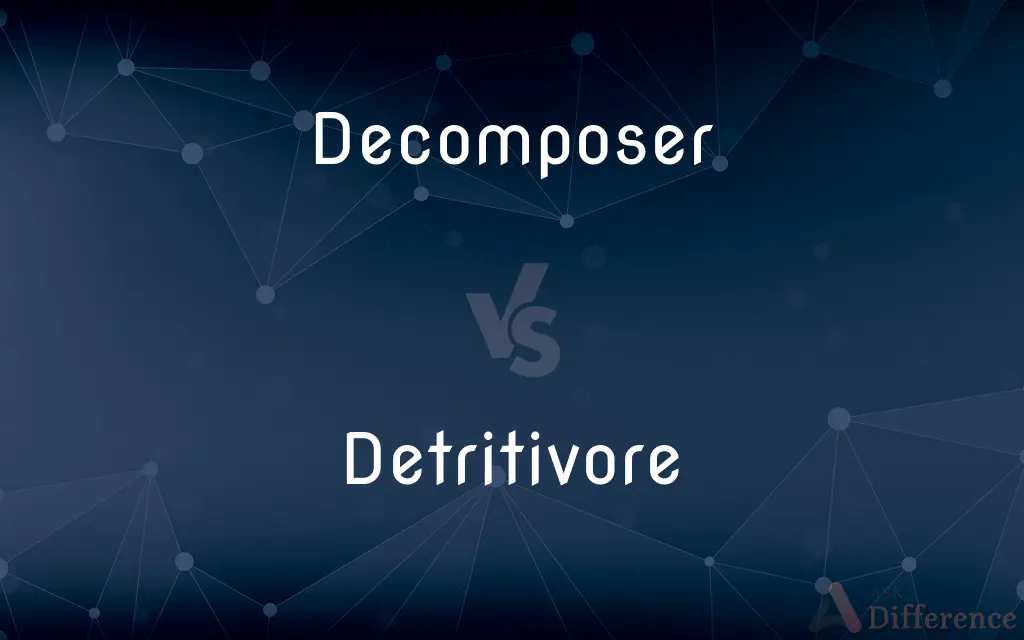Decomposer vs. Detritivore — What's the Difference?
By Fiza Rafique & Maham Liaqat — Updated on March 21, 2024
Decomposers break down dead organic material at a microscopic level, while detritivores physically ingest detritus, contributing to decomposition.

Difference Between Decomposer and Detritivore
Table of Contents
ADVERTISEMENT
Key Differences
Decomposers, such as bacteria and fungi, play a crucial role in ecosystems by chemically breaking down dead organisms and waste products into simpler substances. These organisms facilitate the recycling of nutrients back into the environment. Detritivores, on the other hand, are organisms like earthworms and certain insects that consume decomposing organic matter, known as detritus, and in the process, contribute to the further breakdown and recycling of organic material.
While decomposers directly convert organic matter into simpler inorganic substances, detritivores first ingest and then internally digest detritus, which is then further broken down by decomposers after being excreted. This highlights a key difference in their roles within the nutrient cycle, with decomposers completing the process of decomposition at a chemical level, whereas detritivores assist in the physical breakdown and initial stages of decomposition.
Decomposers are generally microscopic and work at a molecular level, often invisible to the naked eye, which contrasts with many detritivores that are larger and can be seen as they physically interact with their environment. This size difference is significant in understanding their respective contributions to the decomposition process and their interaction with the ecosystem.
The activity of decomposers is essential for the release of nutrients into the soil, making them available for uptake by plants. Detritivores, while they also contribute to this process, primarily aid in breaking down and consuming larger pieces of organic matter, thus facilitating the work of decomposers by increasing the surface area available for decomposition.
Both decomposers and detritivores are vital for maintaining the health of ecosystems by ensuring the continuous recycling of organic matter. However, their methods and immediate impacts on the decomposition process differ, reflecting their unique ecological niches and functions within the nutrient cycle.
ADVERTISEMENT
Comparison Chart
Role in Ecosystem
Chemical breakdown of dead material
Physical ingestion of dead material
Examples
Bacteria, fungi
Earthworms, woodlice
Process
Direct conversion to simpler substances
Ingestion followed by internal digestion
Size and Visibility
Microscopic, often invisible
Usually visible, larger organisms
Contribution
Release of nutrients into the soil
Physical breakdown, aiding decomposers
Compare with Definitions
Decomposer
Organisms that chemically break down dead organic material into simpler substances.
Fungi on a decaying log decompose the wood, returning nutrients to the soil.
Detritivore
Organisms that ingest and digest decomposing organic matter.
Earthworms consume soil containing organic matter, aiding in decomposition.
Decomposer
Mostly microscopic, working at a molecular level.
Bacteria in the soil decompose dead leaves, unseen by the naked eye.
Detritivore
Larger, visible organisms that interact physically with their environment.
A woodlouse feeds on dead plant material, contributing to the decomposition process.
Decomposer
Operates on a chemical level to decompose matter.
The enzymes released by decomposers break down complex organic compounds.
Detritivore
Assist decomposers by increasing the surface area available for decomposition.
The feeding activity of detritivores breaks down larger pieces of organic matter.
Decomposer
Essential for nutrient cycling by releasing nutrients into the soil.
Decomposers break down dead plant matter, enriching the soil with essential nutrients.
Detritivore
Facilitate the breakdown and recycling of organic material by consuming detritus.
Detritivores like dung beetles recycle waste, preventing the spread of disease.
Decomposer
Vital for ecosystem health by ensuring the recycling of organic material.
Without decomposers, ecosystems would be overwhelmed with dead material.
Detritivore
Contributes to decomposition through physical and internal processes.
After digesting organic matter, detritivores excrete nutrient-rich waste.
Decomposer
Decomposers are organisms that break down dead or decaying organisms; they carry out decomposition, a process possible by only certain kingdoms, such as fungi. Like herbivores and predators, decomposers are heterotrophic, meaning that they use organic substrates to get their energy, carbon and nutrients for growth and development.
Detritivore
Detritivores (also known as detrivores, detritophages, detritus feeders, or detritus eaters) are heterotrophs that obtain nutrients by consuming detritus (decomposing plant and animal parts as well as faeces). There are many kinds of invertebrates, vertebrates and plants that carry out coprophagy.
Decomposer
An organism, often a bacterium or fungus, that feeds on and breaks down dead plant or animal matter, thus making organic nutrients available to the ecosystem.
Detritivore
An organism, such as a bacterium, fungus, or insect, that feeds on dead plant or animal matter.
Decomposer
(ecology) An organism, such as a bacterium or fungus, which carries out the process of decomposition of organic material.
Detritivore
(ecology) An organism that feeds on detritus; a detrivore, a saprophage.
Common Curiosities
How do detritivores affect the rate of decomposition?
They speed up decomposition by breaking down large pieces of organic matter.
What is the primary function of decomposers in an ecosystem?
Decomposers chemically break down dead organisms and waste, recycling nutrients.
How do detritivores differ from scavengers?
Detritivores consume decomposed matter, while scavengers eat larger, fresher carrion.
Are all decomposers microscopic?
Most are, like bacteria and fungi, but there are exceptions.
Can a detritivore also be a decomposer?
No, detritivores and decomposers have distinct roles; detritivores are not decomposers.
What types of environments do decomposers thrive in?
They are found in all ecosystems but thrive in moist, warm environments.
How do detritivores contribute to the decomposition process?
Detritivores ingest and digest decomposing matter, aiding in its physical breakdown.
Can detritivores help control disease?
Yes, by consuming and decomposing waste, they can prevent the spread of pathogens.
Why are decomposers important for soil health?
They release essential nutrients into the soil, promoting plant growth and fertility.
Do detritivores directly absorb nutrients from decomposing matter?
They ingest matter and absorb nutrients during digestion, then excrete what remains.
What would happen in an ecosystem without decomposers?
Organic material would accumulate, and nutrient cycling would be disrupted.
How do decomposers and detritivores interact in an ecosystem?
Detritivores prepare organic matter for further decomposition by decomposers.
Is the presence of decomposers an indicator of a healthy ecosystem?
Yes, active decomposers signify a dynamic nutrient cycle and ecosystem health.
Are decomposers affected by environmental changes?
Yes, extreme temperatures and pollutants can hinder their activity.
Can detritivores live in aquatic environments?
Yes, many detritivores, like certain insects and crustaceans, thrive in water.
Share Your Discovery

Previous Comparison
Intergenerational vs. Intragenerational
Next Comparison
Canopy vs. ShedAuthor Spotlight
Written by
Fiza RafiqueFiza Rafique is a skilled content writer at AskDifference.com, where she meticulously refines and enhances written pieces. Drawing from her vast editorial expertise, Fiza ensures clarity, accuracy, and precision in every article. Passionate about language, she continually seeks to elevate the quality of content for readers worldwide.
Co-written by
Maham Liaqat













































